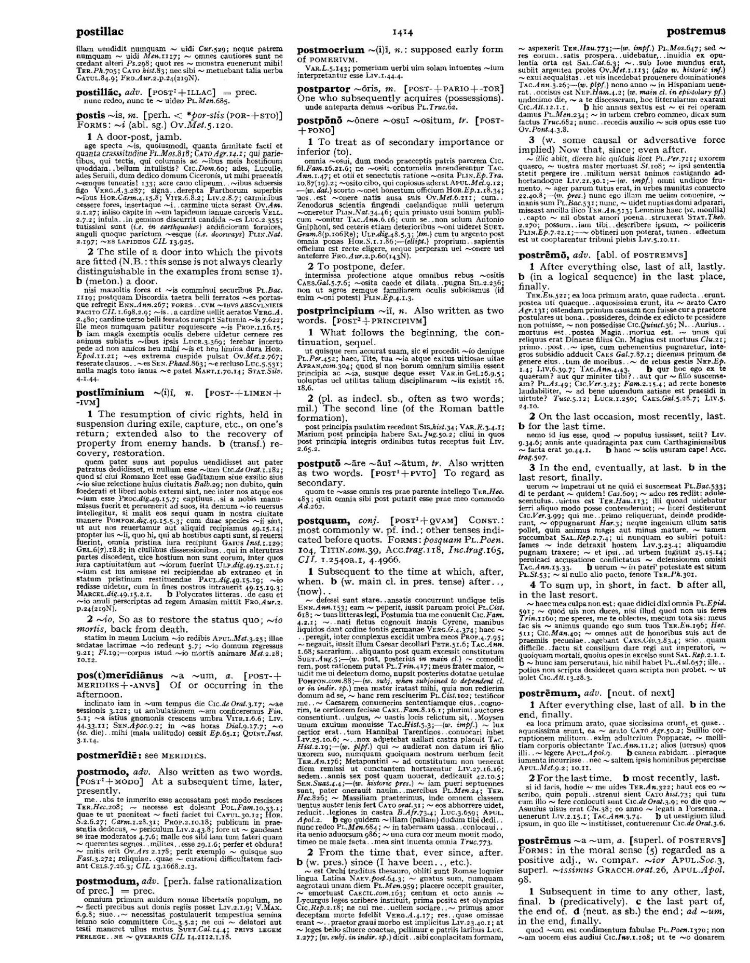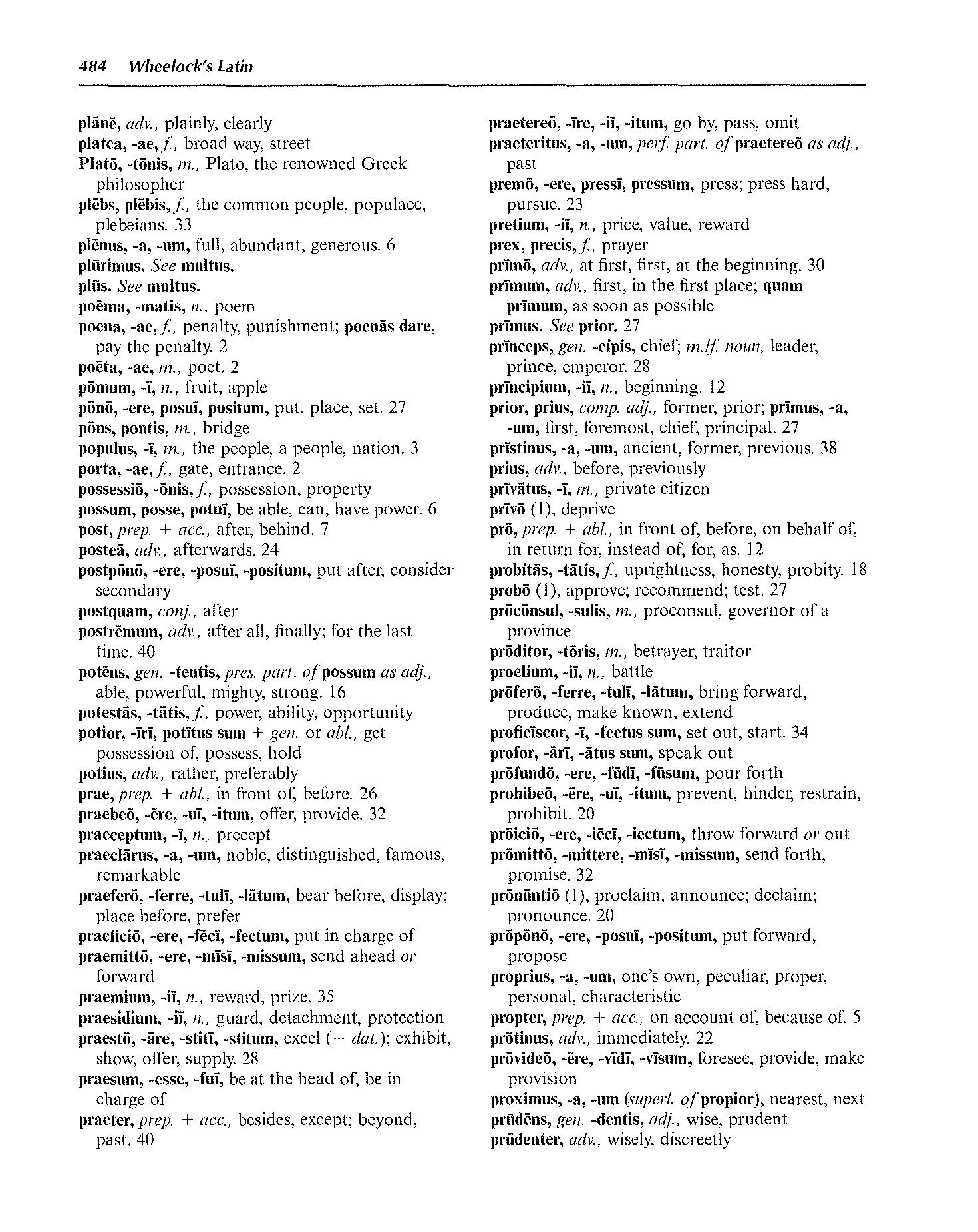
page_listing.tpl
page_subListingDetails.tpl
sub_listingDetails_style1.tpl
sub_listingDetails.title.tpl
postquam after
postquam is a Latin Conjunction that primarily means after.
Definitions for postquam
Wheelock's Latin
Conjunction
- 1
after
Oxford Latin Dictionary
Conjunction
- 1
Subsequent to the time at which, after, when. (b) (w. main cl. in pres. tense) after.., (now)..
- 2
From the time that, ever since, after. (b) (w. pres.) since (I have been.., etc.).
- 3
(w. some causal or adversative force implied) Now that, since, even after.
Sentences with postquam
Latin to English
Id quod in advorsis rebus optaverant otium postquam adepti sunt, asperius acerbiusque fuit.Compare Thus the peace which they had desired proved all the more cruel and harsh after they got it.
Placere occepit graviter, postquam emortuast. [Plocium]Compare I began to like her tremendously once she died.
Postquam est mortem aptus Plautus, comoedia luget, scaena est deserta, dein risus ludus iocusque et numeri innumeri omnes conlacrumarunt.Compare Since Plautus met death, comedy mourns and the stage has emptied, then laughter, frolic, wit, and countless numbers all bewailed him. [Epitaph on himself]
Odisse coepi, postquam parricida matris et uxoris, auriga et histrio et incendiarius extitisti.Compare I began to hate you when you became the murderer of your mother and your wife, a charioteer, an actor, and an incendiary.
Undecimus dies postquam a tu discedo, hic littera scribo.Compare I wrote this letter on the eleventh day after I had left you.
Data sources
Notes
- Definitions
- Frederick M. Wheelock, Wheelock's Latin, 6th ed., rev. Richard A. LaFleur (New York, NY: HarperCollins Publishers, 2005): 484.
- P. G. W. Glare, Oxford Latin Dictionary, Vols. 1-8 (Oxford: Clarendon Press, 1982): 1414.
- Word frequencies
- Christopher Francese, "Latin Core Vocabulary," Dickinson College Commentaries, last modified 2014, http://dcc.dickinson.edu.
- Paul B. Diederich, The Frequency of Latin Words and Their Endings, PhD diss., (Columbia University, 1939).
- Louis Delatte, Suzanne Govaerts, Joseph Denooz, and Etienne Evrard, Dictionnaire fréquentiel et index inverse de la langue latine [Frequency Dictionary and Inverse Index of the Latin Language] (Liège, Belgium: Laboratoire d'analyse statistique des langues anciennes de l'Université de Liège [L.A.S.L.A.], 1981): 121.
Bibliography
Allen, Joseph H. Allen and Greenough's New Latin Grammar for Schools and Colleges: Founded on Comparative Grammar. Edited by James B. Greenough, George L. Kittredge, Albert A. Howard, and Benjamin L. D'Ooge. Boston, MA: Ginn & Company, 1903.
Crystal, David. A Dictionary of Linguistics and Phonetics. 6th ed. Oxford, UK: Blackwell Publishing, 2008.
Delatte, Louis, Suzanne Govaerts, Joseph Denooz, and Etienne Evrard. Dictionnaire fréquentiel et index inverse de la langue latine [Frequency Dictionary and Inverse Index of the Latin Language]. Liège, Belgium: Laboratoire d'analyse statistique des langues anciennes de l'Université de Liège (L.A.S.L.A.), 1981.
Diederich, Paul B. The Frequency of Latin Words and Their Endings. PhD diss., Columbia University, 1939.
Francese, Christopher. "Latin Core Vocabulary." Dickinson College Commentaries. Last modified 2014. http://dcc.dickinson.edu/latin-vocabulary-list.
Gildersleeve, Basil L., and Gonzales Lodge. Gildersleeve's Latin Grammar: Third Edition, Revised, and Enlarged. 3rd ed. London, England: Macmillan and Co., 1903.
Glare, Peter G.W. Oxford Latin Dictionary. Vols. 1-8. Oxford, England: Clarendon Press, 1982.
Krüger, Bernd. "Latin Conjugation Tables." Cactus2000. Accessed May 5, 2023. https://latin.cactus2000.de/index.en.php.
Pierson, Nick. "Sound of Text." Accessed October 26, 2019. https://soundoftext.com.
Wheelock, Frederick M. Wheelock's Latin. 6th ed. Revised by Richard A. LaFleur. New York, NY: HarperCollins Publishers, 2005.
Wiktionary Contributors. "Victionarium." Wikimedia Foundation, Inc. Updated March 18, 2019. https://la.wiktionary.org/wiki/Victionarium:Pagina_prima.
Citation
Chicago (17th ed.)
Allo Contributors. "postquam (conj.) - Latin Word Definition." Allo Latin Dictionary. Last modified . Accessed February 19, 2026. http://ancientlanguages.org/latin/dictionary/postquam.
Entry created on . Last updated on .







